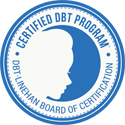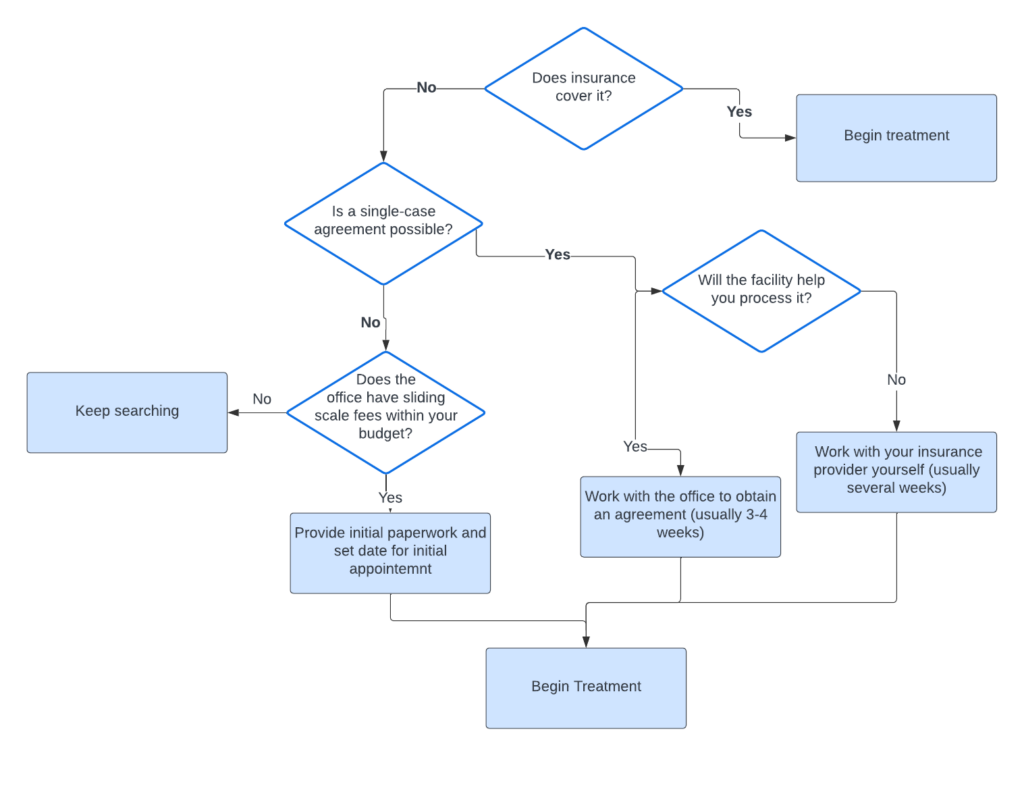How to Find a Good DBT Therapist
If you or a loved one have been struggling lately, you might be wondering how to find a good DBT therapist. Here are the main things to consider as you begin your search.
How to Find a Good DBT Therapist: What to Look For
| What to Look for | Good | Better | Best |
| Training and Certification | Intensive TIC or BTEC training (>10 days) by B-Tech or TIC, or similar intensive training from a DBT-LBC certified therapist. | DBT cases supervised by a certified DBT therapist | DBT-Linehan Board of Certification (DBT-LBC) |
| DBT Consultation Team | Has other expert-level DBT colleagues to consult with about difficult situations that arise with DBT clients | Regular team meetings with DBT therapists who offer each other advice and support with difficult therapy situations | Weekly team meeting with DBT therapists in a single comprehensive DBT program/clinic |
| Skills Coaching Availability | Some availability | Available outside of business hours for crisis and non-crisis coaching | Available 24/7 for emergencies |
| Payment | Sliding scale fee structure | Single-case agreement | In-network (rare) |
Certification
The DBT-Linehan Board of Certification credential represents the gold standard for verifying the training and competence of DBT therapists; however, if you cannot find a DBT-LBC certified therapist, you can search online directories for therapists who have completed the required intensive training (>10 days) by Behavioral Tech Institute (B-tech – https://behavioraltech.org) or the Treatment Implementation Collaborative (TIC – www.ticllc.org). ((directory of trained DBT therapists).

Staff Training
Consider the training of the entire facility rather than just the therapist. One of the four modalities of DBT treatment is the consultation team, which acts as a support for the clinician to ensure excellent treatment. An important rule of thumb concerning this modality is that if there is no team, it is not DBT. A consultation team usually consists of psychologists/counselors, social workers, and psychiatrists. One way to determine a good facility is if staff have completed any intensive (at least 10 days long) training sessions held by B-tech or TIC.
Skill Coaching
Skill coaching is one of the four central modalities of DBT treatment in which therapists or team members are available to coach patients through stressful situations to help prevent them from falling into negative or self-destructive behaviors. The absence of skills coaching services indicates inferior DBT. The best DBT therapists will be available close to 24/7 to accommodate emergencies. If they are not available, they should have a team member who can step in to help, even in after-hours emergencies.
Availability
A good DBT therapist is regularly inundated with requests for new patient appointments, and many have accordingly turned to telehealth or Zoom-based virtual sessions. While some people prefer the convenience of virtual therapy sessions, others may need the structure and connection in-person appointments provide. Make sure the therapist is available in the meeting format that will work best for you or your loved one.
Payment
In the best-case scenario, a good DBT therapist will take your insurance, but this is often (less than 10% of the time) not the case. If they don’t take your insurance, find out whether the office will take a single-case agreement – this is an exception made by your insurance to cover treatment at a particular office despite it not being covered in your plan, which often occurs at an out-of-network rate.
A good litmus test for the facility’s overall quality is whether they can/will help you process these agreements. These cases often have a much higher rate of success (~80%, as opposed to doing it yourself, which has a significantly lower rate of ~10%) and take a shorter period for approval (about 3-4 weeks).
Navigating the Maze of Insurance

Figuring out how to find a good DBT therapist requires working with the therapy office and your insurance.
If a single case agreement is not an option, the only two options are:
- Discuss sliding scale fees: Unfortunately, many DBT therapists are not in network with your insurance, so find out if specific therapists or clinics offer any sliding fee options for new patients.
- Keep searching: If the office won’t work with your insurance or your budget, the only choice is to keep looking for someone who meets the criteria.
How to Find a Good DBT Therapist? Ask the Right Questions
The above sections detail how to find a good DBT therapist based on information usually found on their website or other available materials. This section, rather, focuses on what to do upon your initial consultation with the potential therapist.
What to Ask Potential Therapists
What DBT modalities do you offer?
DBT treatment consists of 4 methods for treatment. These are:
- Individual Therapy
- Skills Training Group
- Skills Coaching
- Consultation Team
Ideally, a therapist or clinic will do all of the above. A good DBT therapist might only offer a few of these components, but they will be forthcoming about the ones they do not provide. If the therapist tries to convince you their limited approach is “still DBT” or if they cannot tell you what the four modalities are, move on.
Where were you certified?
A good DBT therapist will be as transparent as possible when discussing their credentials, providing you with the information both verbally and in writing so that you can do further research on your own time following the initial consultation. Similarly, their credentials should be listed on their website.
What experience do you have treating patients with [condition name]?
Although DBT was initially developed to treat borderline personality disorder, it is now used to treat a wide variety of behavioral disorders. Ensure that the therapists you are working with not only have experience with DBT treatment but specifically in using it to treat your condition. For example, if you have PTSD, ask if they have training in prolonged-exposure (DBT-PE), which is the gold standard for treating PTSD in DBT379.
Are you able/willing to provide success rates?
A good DBT therapist should be prepared to provide you with specific information on treatment outcomes from their clinic. Pay close attention to hard data they provide on treatment outcomes rather than any information presented as customer testimonials or case studies, since these have a higher likelihood of cherry-picking.
Find a Good DBT Therapist With Compass Behavioral Health
At Compass Behavioral Health, we treat depressed and anxious children and young adults with gold-standard, evidence-based treatments that create mastery, a sense of belonging, and a purposeful life. Our program is overseen by clinicians certified by the DBT-Linehan Board of Certification®, meaning only the most experienced therapists and medical staff will provide your child with individualized treatment at our employee-owned facility.
Schedule your free consultation today to learn more about our programs.

Dr. Milton Brown, Ph.D
Dr. Brown is the founder of DBT Center of San Diego and a Linehan-trained DBT clinician who trained directly under Marsha Linehan for over a decade. Brown also teaches classes at the California School of Professional Psychology, teaching DBT modalities and techniques to graduate students. Finally, he is an active member of the Association for Behavioral and Cognitive Therapies (ABCT). Brown specializes in personality disorders, suicidality and self-harm, shame and self-hatred, rejection sensitivity, CBT, and exposure therapy. Compass Behavioral Health and Dr. Brown share a DBT training program for doctoral-level trainees.
You can reach out to Dr. Brown at the DBT Center’s contact page.

